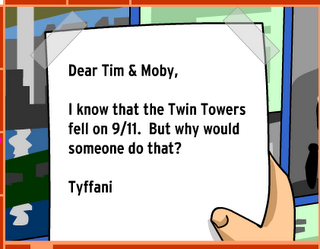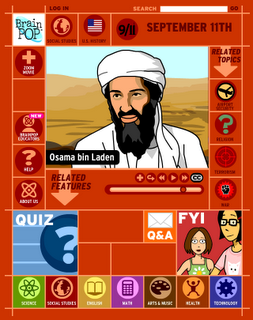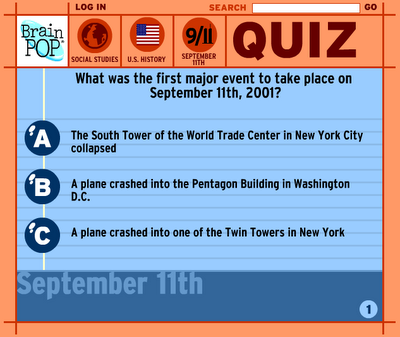9/11 the Cartoon and Multiple-choice Test
 BrainPop gives me a headache.
BrainPop gives me a headache.I have long tried to make sense of BrainPop, a web-based library of short cartoons covering "hundreds of standards-aligned topics within science, social studies, english, math, arts and music, and technology; all supported with engaging movies and interactive assessment tools. Web-delivered and searchable by state standards,"
For quite some time I've wondered what a teacher would actually do with BrainPop or BrainPop Jr. Why would you show cartoons in the classroom? Who is the author of the content? How do you know that the information is unbiased, valid, factual or interesting? Shouldn't "Internet Age," learners engage with primary sources from a variety of experts with differing perspectives. How can complex issues and concepts from every discipline be reduced to a short cartoon? What do students do after watching one of the cartoons?
My ambivalence regarding BrainPop got more confusing this week after I received a press release announcing SEPTEMBER 11TH IN THE CLASSROOM: BRAINPOP RELEASES FREE MOVIE THAT HELPS ANSWER CHILDREN’S DIFFICULT QUESTIONS. BrainPop is giving away access to a 5:44 minute cartoon explaining the attacks of 9/11/2001. I'll take the company at its word that it is not exploiting the national tragedy for cynical commercial reasons, but "help teachers communicate with students" about a "sensitive topic."

With much trepidation I hit the play button. The simple 2-D cartoon features Moby the BrainPop robot and his human friend telling the story of 9/11 in a chronological narrative about the attacks and a bit of background information on the terrorists. The cartoon sticks to the facts with little nuance and one politically-correct perspective. The content was not particularly objective even if you think that children should relive 9/11 even in cartoon form.
My viewing of BrainPop cartoons suggests that too many topics are addressed in too little time, with complex issues, stories or concepts reduced to the most trivial level of education - vocabulary development. The excessive volume of vocabulary introduced in the short 9/11 cartoon almost guarantees a trivial handling of complex and potentially controversial issues. Front-loading vocabulary without context, relevance, and most importantly, experience with the underlying ideas is one of the biggest pedagogical error made by educators. Knowing the names of types of angles without experience working with angles is not mathematics -it's memorization.

The 9/11 cartoon covers the chronology of the attacks, Al Quaeda, the Pentagon, terrorism, the Department of Defense, Osama Bin Laden, Islam, religious fundamentalism and more in just five minutes! In such scenarios, understanding is unlikely or purely accidental.
Fans of products like BrainPop justify its use by saying, "The kids love it!" By that peculiar standard, why not let the kids go home early or fill them with candy while in class? They love it compared to what? Given the choice between thinking, working or watching TV, most kids will choose the cartoon. The fact that the delivery of BrainPop cartoons is via the Web is inconsequential. This is TV cartoons without the artistry, storytelling or whimsy of great animation.
It is disingenuous to suggest that BrainPop cartoons are just tasty appetizers used to introduce a topic or inspire student interest. In order to justify the annual school subscription of $700-$1,400/year requires the company to make outlandish claims about state standards alignment and that the cartoons meet "the needs of multiple learning styles." How many learning styles are supported by watching a cartoon?
Like most shallow easily pitched curriculum products, part of BrainPop's appeal is based on its built-in assessment scheme.
That's right! You guessed it! If you enjoyed the cartoon about the horrific tragedy of 9/11 you will love the multiple choice quiz that follows.

Turning 9/11 into a game of trivial pursuit in the name of standards alignment or assessment is most vulgar. Asking students to select the first World Trade Center that collapsed first is not a measure of understanding. It is a test of recall and nothing more.
Reducing a recent national nightmare to a cartoon may be in bad taste, but the multiple-choice test that follows reveals our real priorities.

7 Comments:
Our politicians turn the events of 9/11/01 into true-or-false campaign fodder. This kind of trivialization only follows their lead.
By Tim, At
September 11, 2008 3:40 AM
Tim, At
September 11, 2008 3:40 AM
It's pretty clear this country hasn't figured out how to absorb the 9/11 event and make meaning out of it. My guess is that we are just too close in time, in BIG historical time, to do that right now. I wonder if there were similar weird and inappropriate responses in the decade following Pearl Harbor. I bet there were.
You do ask a bigger question, and to for that I think the answer is more condemning. I really think the dominant cultural stream in this country is all about quick and easy, mediagenic, and celebrity. That troubles me more than the 9/11 expoitation which turns out to be more symptom than problem.
By Linda Polin, At
September 11, 2008 9:08 AM
Linda Polin, At
September 11, 2008 9:08 AM
I find sites like brain-pop, freerice.com etal, are like snacks for my H.S. Students. Once they have digested the main course they can have a bit of fun. BUT, we are a 1:1 computer:student school and project based so they have access to computers continuously. That does not say I think the Brainpop handling of 9/11 was good.
My students can't add without using their fingers, don't know their multiplication tables, and don't even attempt to divide without a calculator. Anything outside my course requirements that gets them to review the basic skills and that they view as a reward can't be all bad.
By Chris Fancher, At
September 11, 2008 7:06 PM
Chris Fancher, At
September 11, 2008 7:06 PM
Tim used the right word: trivial. But what is the appropriate response for schools? I was in two schools and three different classrooms yesterday and not one did anything to commemorate this tragedy. I found myself wondering if they should? The kids would have been 3 or 4 when it happened so would have little personal memory. But shouldn't schools at least be part of the moment of silence? Heck, they get the whole day off for Memorial Day and most don't do anything of a memorial nature. Shouldn't we at least take a minute to remember?
By Karen, At
September 12, 2008 5:24 AM
Karen, At
September 12, 2008 5:24 AM
Great article...I saw a site that is going beyond the traditional Q&A with interactive games to engage, www.gamingkrib.com , and will have puzzles on and OFF computer...looks interesting in design, see if it flies with edu. From what I read, Brainpop is built by India programmers and educators on contract...which is why so simple in design, not that they don’t know how to build edu, I think gets lost in translation.
By Anonymous, At
September 14, 2008 4:29 PM
Anonymous, At
September 14, 2008 4:29 PM
I am curious to know how you would answer the question Tyffani's question. These are the kinds of questions kids ask and want answers to. While I do think that it covers a lot of ground in very little time, I do think any way we can engage children and keep them interested by communicating on their level is worth something. BrainPOP does a nice job at opening up the lines of communication. I do not think it is meant to be a stand alone lesson, but a springboard into a larger lesson to open the lines of communication.
I believe that is how most teachers use the technology - it's an icebreaker - a quick introduction into a larger lesson or discussion.
In that context I believe BrainPOP does serve a purpose and can be a valuable tool in the classroom or at home for families.
By Deborah, At
September 15, 2008 6:48 PM
Deborah, At
September 15, 2008 6:48 PM
Gary,
You're not giving teachers enough credit. You assume teachers will show the video in isolation or sit a student in a corner to watch the video independently with no integrated activities. All publishers sell their content on the premise that their product can stand alone, but true educators know that nothing can stand alone. BrainPop is terrific to engage students and begin a conversation or to review a lesson or even to step aside during. There's nothing wrong with cartoons or candy, in moderation.
By Lee Kolbert, At
September 19, 2008 6:52 AM
Lee Kolbert, At
September 19, 2008 6:52 AM
Post a Comment
<< Home